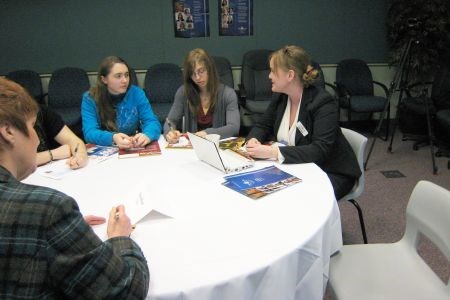The PARO Centre for Women's Enterprise is extending its reach into northeastern Ontario.
This fall, the Thunder Bay-based women's entrepreneurs organization is reaching out to francophone and Aboriginal women with a slate of online programming and conferences.
For executive director Rosalind Lockyer, making inroads into the northeast and Far North to establish relationships, drive their programming and create more growth opportunities for women's business is akin to “throwing a stone in the brook that ripples out.”
Through Contact North, a distance education network, PARO is also offering a full-slate of weekly e-learning courses and interactive workshops in French.
Last spring, PARO landed $334,000 from Industry Canada to expand its service geared to francophone women in the region. PARO is establishing a women's entrepreneurial network in four areas: Timmins-Hearst, Chapleau-Dubreuilville, Marathon-Manitouwadge and Ignace-Upsala.
The network's structure still has to be determined, said Lockyer. PARO won't necessarily have small business advisors in each community, but it supports the creation of “business clusters” as well as opening up its catalogue of small business resources, support, workshops and e-learning opportunities to new and existing women entrepreneurs.
“With any group of women we're doing work with there needs to be a way they can connect with like minds.”
Lockyer founded PARO in 1995 as a training and empowerment organization for women entrepreneurs in helping start or grow their business.
It offers professional development workshops, one-on-one counselling, grant application assistance and a plethora of training programs in marketing, bookkeeping and financial literacy, many offered through web learning applications.
PARO has become one of the strongest peer lenders of small business loans in North America.
“As an individual small business in a community you can become very isolated and no business can survive in isolation. It's by building relationships with various partners,” said Lockyer.
The organization discovered that many women registering for PARO's e-learning session originated from the northeast. Once a week the PARO on Wheels training van is on the road to conduct workshops in communities across the North and PARO advisors often fly up to the remote communities to meet with Aboriginal women.
A good chunk of PARO's success has come through leveraging partnerships and securing funds from government granting agencies based on its indepth knowledge and extensive research of knowing the needs of women entrepreneurs in the North.
“In our five-year plan, we needed to do more work with francophone and Aboriginal women,” said Lockyer.
At the remote Sandy Lake First Nation, PARO is working with a group of crafters to overcome barriers by finding better ways to market and sell their goods to consumers worldwide.
“Part of what we're doing is trying to build sustainable communites.”
Lockyer said the recession and downturn of the forestry industry decimated many communities, but the PARO-assisted small businesses didn't suffer that much because they were built on customer-to-customer relations.
When they enter a new community, Lockyer said they often seek alliances with local Community Futures Development Corporations, training boards, chambers of commerce, and various development and business groups.
“Our approach is women-centred. In most programs, you have to meet the criteria to be eligible. For PARO, the woman comes to us and we say, 'what do you need,' and we find the resources to fit her needs. It's a more holistic approach.”
PARO will take that approach to two upcoming women's economic forums in Hearst (Oct. 28-29) and Chapleau (Nov. 14 and 18).
Lockyer said oftentimes many small business owners never realize what support mechanisms and funding programs are available to them in their home communities. “That's part of what we'll be doing in these forums, letting them know what resources are available to them.”




